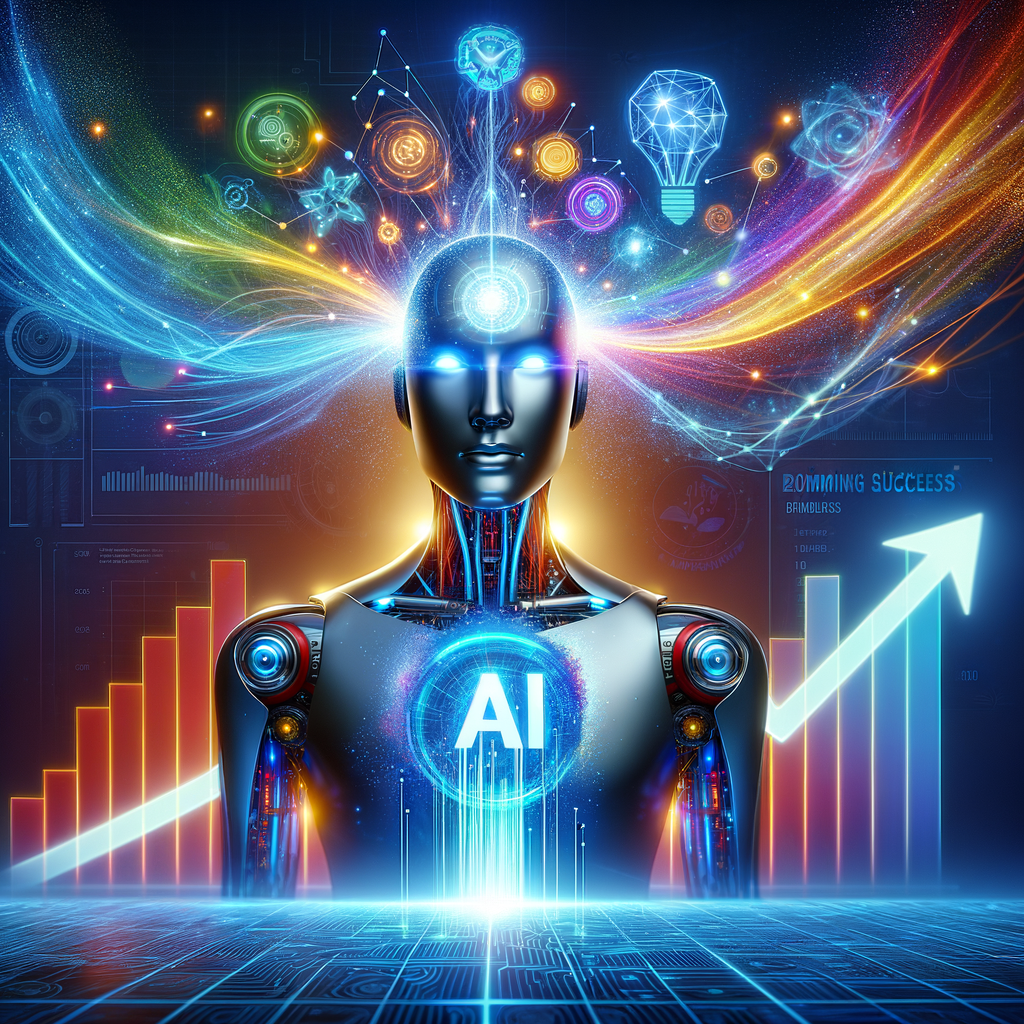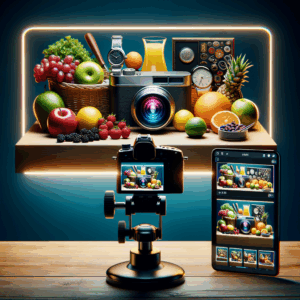
Best Practices For Stunning AI-Driven Branding Success
- Developing a Clear Brand Identity
- Crafting a Compelling Brand Narrative
- Leveraging AI for Market Research
- Implementing Predictive Analytics
- Creating Personalized Customer Experiences
- Employing Chatbots for Enhanced Engagement
- Designing AI-Driven Visuals
- Using AI for Video Content
- Optimizing SEO with AI
- Enhancing User Experience through AI
- Integrating Social Media with AI Tools
- Scheduling and Automating Social Media Posts
- Measuring Campaign Effectiveness with AI Analytics
- Keeping an Eye on Competitors
- Building an AI-Driven Culture
- Encouraging Continuous Learning
- Frequently Asked Questions
- 1. What is AI-driven branding?
- 2. How can AI improve my brand's identity?
- 3. Can AI help with market research?
- 4. How does personalization enhance branding?
- 5. What role do chatbots play in branding?
- 6. How important are visuals in branding?
- 7. What is predictive analytics in branding?
- 8. How does AI enhance SEO?
- 9. Can AI help with competitive analysis?
- 10. What ongoing practices should I implement for AI success?
- Conclusion
- References
Understanding AI-Driven Branding
Branding has always been essential in a competitive market. In recent years, artificial intelligence (AI) has transformed how businesses approach branding. By understanding your brand’s identity through advanced tools, you can create consistent messaging that resonates with your audience. AI helps designers and marketers analyze data, making it easier to craft a brand strategy that truly stands out.
The beauty of AI in branding lies in its ability to tailor experiences for individual users. Personalization enhances customer engagement, thereby helping brands foster better relationships. Utilizing AI-driven insights allows for targeted messaging that feels personal and relevant. This is a game-changer in a digital landscape filled with noise.
To achieve stunning results, companies must adopt best practices in their AI-driven branding efforts. This guide will explore methods to harness the full potential of AI in branding while creating a cohesive and effective brand strategy.
Developing a Clear Brand Identity
A strong brand identity is the foundation of effective branding. Your brand identity encompasses your logo, colors, typography, and messaging. Consistency in these elements is vital. AI tools can assist in creating and analyzing visual content, ensuring that each piece aligns with your brand’s core values.
To begin, define your brand’s mission, vision, and values. Use AI tools like sentiment analysis to gauge how potential customers perceive your brand. This helps in shaping a relatable brand personality. Having clear visuals backed by data-driven decisions enhances your brand’s image, making it more memorable.
Crafting a Compelling Brand Narrative
Storytelling plays a vital role in branding. Your brand’s narrative reflects its values and connects with your audience. AI can help you craft a compelling brand narrative by analyzing customer data to understand what resonates with your target market.
For example, using natural language processing (NLP), you can analyze social media discussions to extract common themes or sentiments. Integrate these insights into your brand story. This approach creates a narrative that feels authentic and resonates with your audience on a deeper level.
Leveraging AI for Market Research
Market research is crucial for understanding your audience. AI tools can analyze vast amounts of data quickly, providing insights that identify trends and customer preferences. This information is invaluable when making branding decisions.
Utilize AI to conduct surveys and gather feedback efficiently. Machine learning algorithms can analyze responses, helping to uncover patterns you might overlook otherwise. This data-driven approach ensures you remain informed about your audience’s shifting needs and interests.
Implementing Predictive Analytics
Predictive analytics can further refine your branding strategy. By analyzing past consumer behavior, AI predicts future trends. For example, if data shows an increase in eco-friendly products, your brand might consider adjusting its messaging to highlight sustainability.
Implementing predictive analytics helps brands stay one step ahead. This proactive approach minimizes risks and enhances customer trust. When customers feel that brands understand their needs, loyalty grows, leading to long-term success.
Creating Personalized Customer Experiences
Personalization is a key trend in branding today. AI can help you create tailored experiences for your audience. By analyzing user behavior, AI offers insights that enable you to customize services and communications.
For instance, leveraging recommendation systems enhances the shopping experience. When online retailers use AI to suggest products based on past purchases, customers feel valued. This not only increases sales but also fosters brand loyalty.
Employing Chatbots for Enhanced Engagement
Chatbots serve as a direct link between brands and consumers. They provide immediate interactions, answering questions, and offering support. AI-powered chatbots can analyze past conversations to improve responses, making them increasingly effective over time.
AI allows chatbots to provide personalized recommendations based on user data. By being available 24/7, brands can keep the conversation going, engaging customers even when human agents are unavailable. This seamless interaction enhances the overall customer experience.
Designing AI-Driven Visuals
Visuals play a vital role in how customers perceive your brand. AI-driven tools help create stunning visuals that align with your branding strategy. Whether it’s logos, advertisements, or social media posts, AI can enhance creativity.
Through AI image generation, brands can experiment with different styles and formats quickly. These tools provide vast options for designers, allowing them to create visuals that pop. Moreover, AI helps analyze which visuals resonate best with your audience, fine-tuning future campaigns.
Using AI for Video Content
Video content captures attention effectively. AI tools can streamline video creation, analyze viewer behavior, and optimize content for various platforms. Personalized video recommendations enhance user interaction and increase engagement.
Additionally, AI can help automate editing processes. By identifying the most engaging sections of longer videos, AI allows brands to create quick, impactful content. This ensures you deliver concise messages that resonate with your viewers while saving time and resources.
Optimizing SEO with AI
Search engine optimization (SEO) is crucial for online visibility. AI-driven SEO tools provide insights into keywords, backlinks, and content performance. By leveraging these tools, brands can enhance their online presence and attract more organic traffic.
Using AI for keyword research is a game-changer. These tools analyze search patterns and suggest high-ranking keywords. This allows brands to create content that meets user intent, enhancing discoverability.
Enhancing User Experience through AI
AI can improve user experience across your digital platforms. For instance, using machine learning algorithms, brands can analyze website performance. These insights help in optimizing page load speeds, navigation, and overall usability.
A seamless user experience reduces bounce rates and improves engagement. The longer users stay, the better your chances of converting them into loyal customers. Thus, investing in AI for user experience is not just a trend; it’s a necessity for successful branding.
Integrating Social Media with AI Tools
Social media is a powerful platform for branding. AI tools can analyze audience interactions, helping brands understand what types of content generate engagement. This insight allows for strategic planning to maximize reach.
Consider utilizing AI-driven tools for monitoring conversations about your brand. Sentiment analysis can help gauge public perception and identify areas of improvement. Engaging with your audience based on data-driven insights fosters loyalty and trust.
Scheduling and Automating Social Media Posts
AI tools can also automate social media posting. Scheduling posts at peak engagement times ensures your content reaches a larger audience. Additionally, AI can analyze the performance of different types of content, guiding future content strategies.
Automation frees up valuable time for marketers. Instead of managing social media accounts manually, brands can focus on creating quality content and building genuine relationships with customers.
Measuring Campaign Effectiveness with AI Analytics
Tracking your branding campaigns is essential for determining success. AI-powered analytics tools provide in-depth performance reports that help you understand what’s working and what’s not. These insights allow for informed adjustments to your strategy.
Utilizing AI for A/B testing enables brands to experiment with different messaging and visuals. Analyzing the outcomes helps identify the most effective approaches, ensuring your branding efforts yield the best results. These data-driven decisions empower brands to pivot swiftly where necessary.
Keeping an Eye on Competitors
Monitoring competitors is crucial to maintaining your brand’s edge. AI can provide insights into competitor performance, pricing strategies, and customer acquisition efforts. This knowledge allows you to adjust your branding strategies accordingly.
By benchmarking against competitors, you can identify market gaps and potential opportunities. Use this information to differentiate your brand and position it favorably among consumers.
Building an AI-Driven Culture
To fully leverage AI in branding, create an AI-driven culture within your organization. Encourage collaboration between marketing, design, and tech teams. This interdisciplinary approach fosters creativity and innovation.
Investing in training helps your team understand AI’s capabilities. When employees embrace AI tools, they can use them effectively to amplify creativity and efficiency. This culture leads to more cohesive branding efforts and boosts overall performance.
Encouraging Continuous Learning
The environment surrounding AI is ever-evolving. Encourage your team to stay updated on trends and new tools. Continuous learning helps brands adapt and innovate, ensuring they remain relevant in a dynamic market.
Consider hosting workshops or online courses to facilitate learning. This not only empowers your team but also enhances your overall branding strategy. An informed team can better leverage AI tools to elevate your brand.
Frequently Asked Questions
1. What is AI-driven branding?
AI-driven branding utilizes artificial intelligence technologies to analyze data and craft personalized brand experiences, ensuring effective targeting and engagement.
2. How can AI improve my brand’s identity?
AI helps analyze audience perceptions and preferences, enabling you to refine your brand’s identity, visuals, and messaging effectively.
3. Can AI help with market research?
Yes, AI excels at data analysis, providing insights into trends, consumer behavior, and preferences, which inform your branding decisions.
4. How does personalization enhance branding?
Personalization creates tailored experiences, making consumers feel valued. It leads to increased engagement and brand loyalty.
5. What role do chatbots play in branding?
Chatbots offer immediate support and engagement, ensuring customers’ queries are answered quickly, which enhances overall customer experience and brand trust.
6. How important are visuals in branding?
Visuals are vital for branding. They create first impressions and can influence consumer perception significantly, so quality images and design are crucial.
7. What is predictive analytics in branding?
Predictive analytics analyzes past data to forecast future trends, enabling brands to make proactive decisions that align with consumer needs.
8. How does AI enhance SEO?
AI tools help identify high-ranking keywords, optimize content, and analyze website performance, improving your overall online visibility.
9. Can AI help with competitive analysis?
Absolutely! AI tools can track competitor performance and strategies, providing insights that help you differentiate and position your brand favorably.
10. What ongoing practices should I implement for AI success?
Foster an AI-driven culture, encourage continuous learning, and regularly analyze performance metrics to adapt your strategies effectively.
Conclusion
AI-driven branding offers immense potential for increasing engagement and driving brand loyalty. By following best practices, you can harness the power of AI to create a stunning brand identity. Start with a clear brand narrative and leverage data-driven insights to personalize customer experiences.
The future is bright for brands willing to integrate AI into their strategies. By doing so, you can stay ahead of the competition and foster meaningful relationships with customers. Whether through enhanced visuals, targeted messaging, or seamless interactions, AI can elevate your brand to new heights.
References
– Harvard Business Review: How AI is Changing Brand Marketing
– Forbes: 7 AI Marketing Drivers that Deliver Results
– McKinsey & Company: The Future of AI in Marketing

